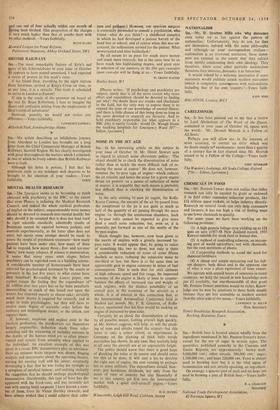CHEMICALS IN FOOD Preston-Tewart does not realise that today research
can only be assisted by grant or endowed if its field either consumes industrial products, like £3} million space rockets, or helps industry directly. Research on natural foods can only help consumers and farmers, it has too high a risk of finding ways to use fewer chemicals to qualify.
For some years we have been working on the following problems : (1) A high protein foliage crop yielding up to 124 tons an acre (1957-58 New Zealand record, 1955 Kenya) suitable for stock feed or human diet.
(2) A method of controlling eelworm, an increas- ing pest of world agriculture, not with chemicals, but the root secretions of plants.
(3) Composting methods to avoid the need for chemical fertilisers.
(4) A cheap and simple measuring rod for fall- out dangers, both direct and in the apparent rise of what is near a plant equivalent of bone cancer. We operate with unpaid teams of amateurs in many countries; we hold the record in new knowledge won per £1 available, but one-thousandth of that grant Mr. Preston-Tewart mentions would be riches. Know- ledge can be won by amateurs in these fields simply because they are less accessible to modern science than the other side of the moon.—Yours faithfully, LAWRENCE D. HILLS Hon. Secretary Henry Doubleday Research Association, Rocking, Braintree, Essex


































 Previous page
Previous page